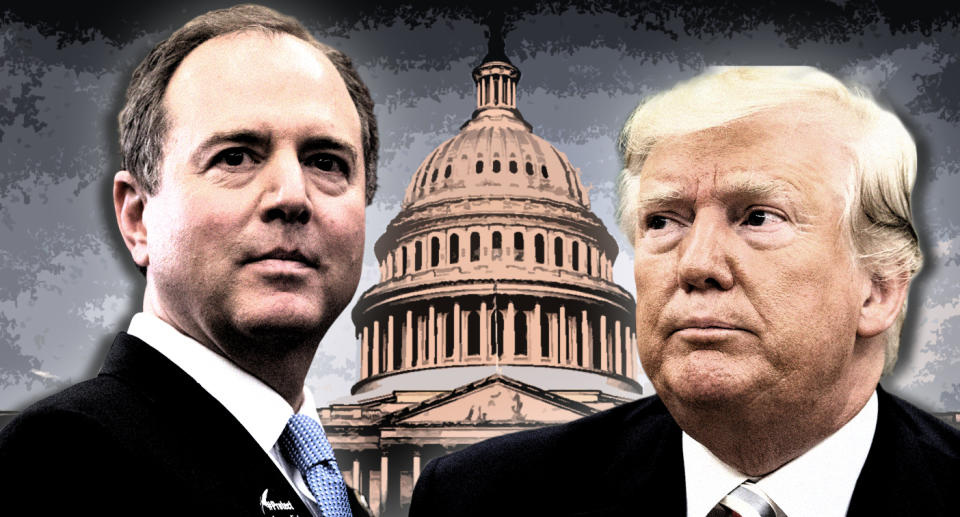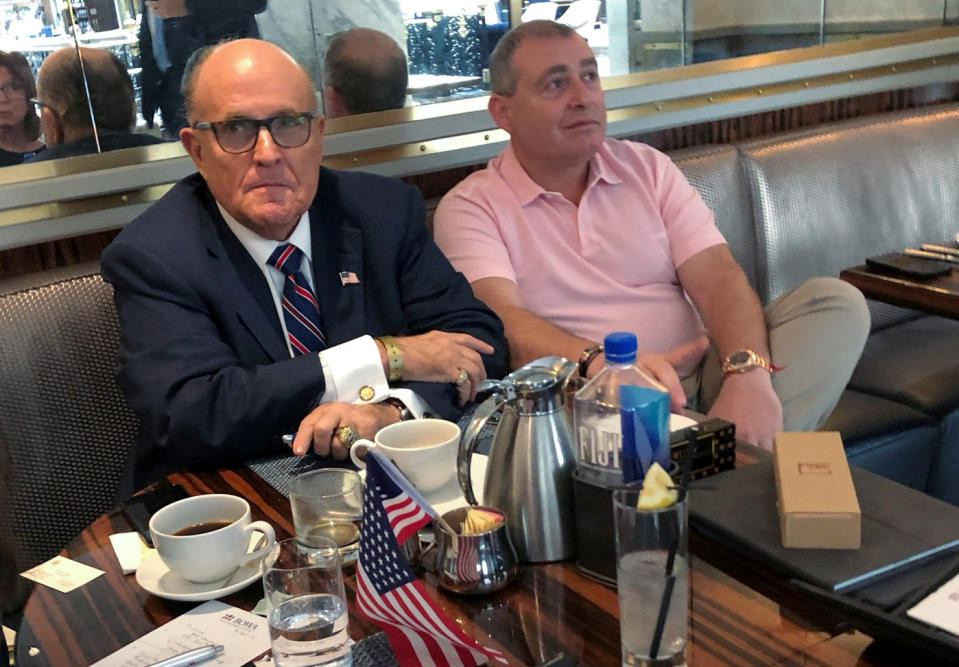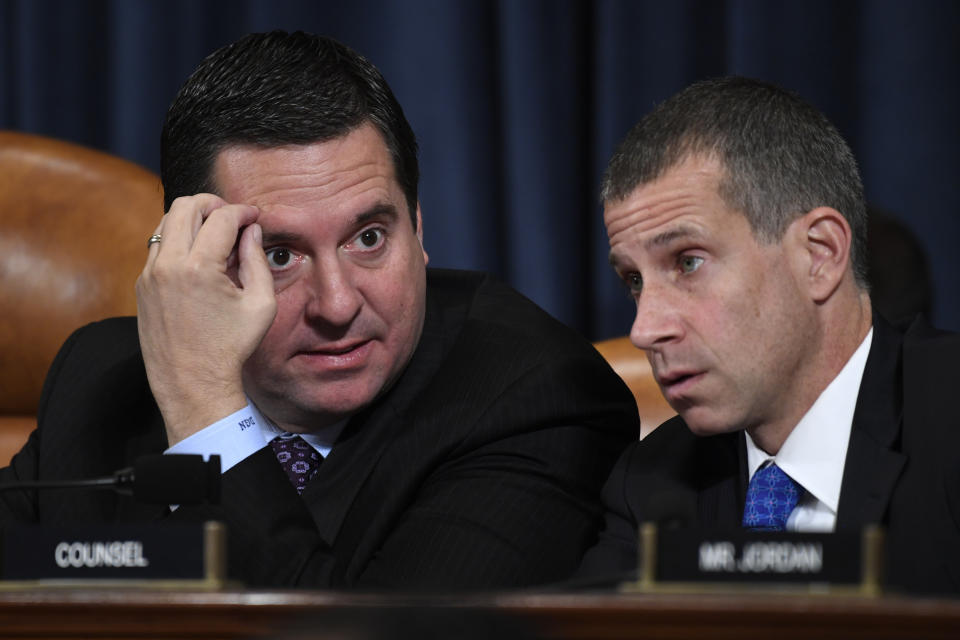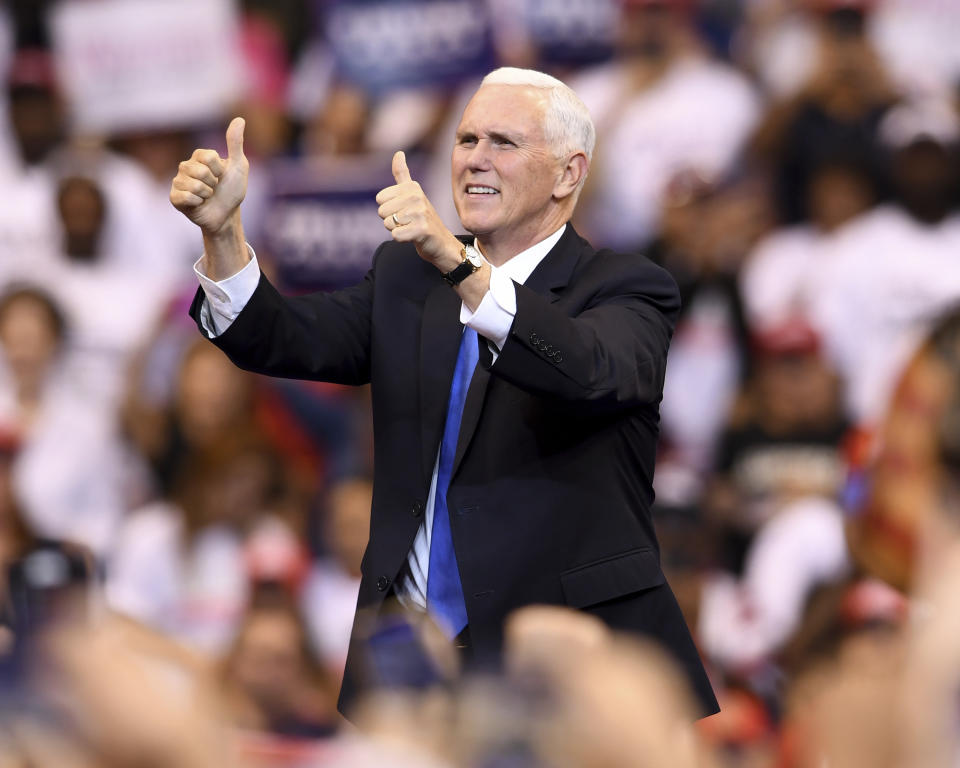Impeachment report finds 'stark evidence of misconduct'
WASHINGTON — Withering in tone and rich with detail, the 300-page impeachment report released by the House Intelligence Committee on Tuesday afternoon sharpened congressional Democrats’ case against President Trump, whom it charged with the “prioritization of his personal political benefit over the national interest.”
The report contains no articles of impeachment; those will be drafted by the House Judiciary Committee, which will hold its own hearing Wednesday. But the report clearly lays out the case against Trump, alleging he exerted improper pressure on Ukraine in seeking an investigation into his political rival, and that he subsequently attempted to obstruct the congressional investigation into that pressure campaign.
In the style of a paperback thriller — though with footnotes — the report describes “a months-long campaign driven by President Trump in which senior U.S. officials, including the Vice President, the Secretary of State, the Acting Chief of Staff, the Secretary of Energy, and others were either knowledgeable of or active participants in an effort to extract from a foreign nation the personal political benefits sought by the President.”

In conducting that campaign, Democrats argue, Trump “placed his own personal and political interests above the national interests of the United States, sought to undermine the integrity of the U.S. presidential election process, and endangered U.S. national security,” House Intelligence Committee Chairman Adam Schiff wrote in a preface to the report.
“In making the decision to move forward,” Schiff’s prefatory note continued, “we were struck by the fact that the President’s misconduct was not an isolated occurrence, nor was it the product of a naïve president. Instead, the efforts to involve Ukraine in our 2020 presidential election were undertaken by a President who himself was elected in 2016 with the benefit of an unprecedented and sweeping campaign of election interference undertaken by Russia in his favor, and which the President welcomed and utilized.”
Russia’s alleged involvement in the 2016 election was the subject of another, earlier report by former special counsel Robert Mueller. But whereas Mueller avoided the question of whether Trump engaged in an impeachable offense — either in working with Russia during the election or, once in office, attempting to obstruct the investigation into Russia’s interference — Schiff and his Democratic colleagues had no such reservations, even as they couched their argument in the grave language of constitutional intent.
“The Founding Fathers,” the report says, “prescribed a remedy for a chief executive who places his personal interests above those of the country: impeachment.”

Even as it laid out the case against Trump, the report offered few new details. Its single greatest accomplishment may be its weaving together the testimony of more than a dozen officials who testified during the impeachment inquiry into a cohesive narrative. The report’s authors were helped by what they call the “remarkable consistency” of impeachment witnesses. “There will always be some variation in the testimony of multiple people witnessing the same events,” the report said, “but few of the differences here go to the heart of the matter.”
Using the testimony of impeachment witnesses, the report describes how Trump’s personal attorney Rudy Giuliani worked throughout the spring and summer of 2019 to pressure Ukrainian president Volodymyr Zelensky to launch two investigations that would benefit Trump’s political prospects, as opposed to U.S. geopolitical interests. One of those investigations would have been into alleged Ukrainian efforts to help Hillary Clinton in the 2016 election, even though the U.S. intelligence community has found no evidence of such a coordinated campaign. Another would have probed the business affairs of Hunter Biden, son of former vice president and current presidential candidate Joe Biden.
Democrats allege that both military aid and a White House meeting were conditioned on the announcement of such investigations. Republicans point out that aid was eventually released, despite Zelensky never acceding to Trump’s demands.

Democrats contend that, despite Ukraine finally receiving aid in September, a July 25 phone call between Trump and Zelensky all but spells out an improper arrangement contrived by the White House. “The call record alone is stark evidence of misconduct, a demonstration of the President’s prioritization of his personal political benefit over the national interest,” says the report.
Republicans have insisted that the phone call was merely Trump conducting foreign policy in his own unique style, and that his concerns about corruption in Ukraine were fully legitimate. They also say that Democrats have wanted to remove Trump from office since the moment he laid his hand on the Lincoln Bible, and that the Ukraine inquiry is simply their latest effort to do so.
The biggest revelation in the report may be the extent to which Giuliani communicated with Trump administration officials. Logs obtained by the House Intelligence Committee show that during the spring of 2019, Giulani was communicating regularly with John Solomon, the Trump-friendly journalist whose articles in The Hill first disseminated conspiracy theories about Ukraine, as well as with Kashyap Patel, a former staffer for Devin Nunes, a ranking member of the House Intelligence Committee and currently an official at the White House.

Giuliani was also in frequent contact with the White House, where his client — intrigued by Solomon’s articles — was allegedly eager to see the political investigations launched. And belying his role as the president’s personal lawyer, Giuliani appears to have also interacted at length with the Office of Management and Budget, which withheld some $250 million in military aid from Ukraine throughout the summer of 2019.
The report also makes clear that Giuliani was in touch throughout the summer. The report also implicates Vice President Mike Pence, who has labored to keep himself out of the impeachment inquiry. According to the report, however, Pence was made aware of the hold on security assistance that was put in place, allegedly at the president’s own behest, in the summer of 2019. Some weeks after that hold was ordered, Gordon Sondland, U.S. ambassador to the European Union, reportedly told Pence during an event in Warsaw that Zelensky’s refusal to announce investigations was hindering the flow of funds from Washington to Kyiv.
“Everything is being held up until these statements get made,” Sondland says he told Pence.
“Vice President Pence nodded in response,” according to the impeachment report, “apparently expressing neither surprise nor dismay at the linkage between the two.” Pence has denied any knowledge of improper action being taken against Ukraine by the Trump administration.
Another top official who comes under scrutiny in the report is Secretary of State Mike Pompeo, who like Pence has tried to stay as far from the Ukraine affair as possible. Pompeo’s name appears 127 times in the impeachment report, which appears to back up Sondland’s assertion that he kept the secretary of state fully informed of the pressure being applied by Giuliani and others on Zelensky.
Much like Pence, Pompeo has denied any involvement in an improper influence campaign, at times growing irritated at impeachment-related questions.

Much like the Mueller report, the impeachment report is two-pronged, describing both an act of malfeasance, the pressure campaign and the attempt to obstruct an investigation, which Democrats insist is a crime of its own.
“The evidence of the President’s misconduct is overwhelming, and so too is the evidence of his obstruction of Congress,” the committee’s Democrats write. “Indeed, it would be hard to imagine a stronger or more complete case of obstruction than that demonstrated by the President since the inquiry began.”
The White House counseled administration officials not to participate in the impeachment inquiry, though some did so anyway. And it is, for the most part, lawsuits and leaks that have brought key documents to light. The refusal to cooperate has clearly angered congressional Democrats, as the report makes clear. “Not a single document has been produced by the White House, the Office of the Vice President,” they write, “the Office of Management and Budget, the Department of State, the Department of Defense, or the Department of Energy in response to 71 specific, individualized requests or demands for records in their possession, custody, or control.”
Republicans have released a report of their own, which argues that Trump did nothing wrong. Its attitude of defiant innocence was echoed on Tuesday afternoon by White House communications director Stephanie Grisham, who called the Democrats’ report the culmination of “sham processes” that “reflects nothing more than their frustrations.”
_____
Download the Yahoo News app to customize your experience.
Read more from Yahoo News:
How Chief Justice John Roberts would lead the Senate impeachment trial
Top Navy SEAL faces uncertain future after Trump intervention
As Supreme Court weighs DACA, Trump pushes fiction about 'hardened criminals'
PHOTOS: The provocative new book 'Independent Mysteries' explores the sense of 'intimate distance'



